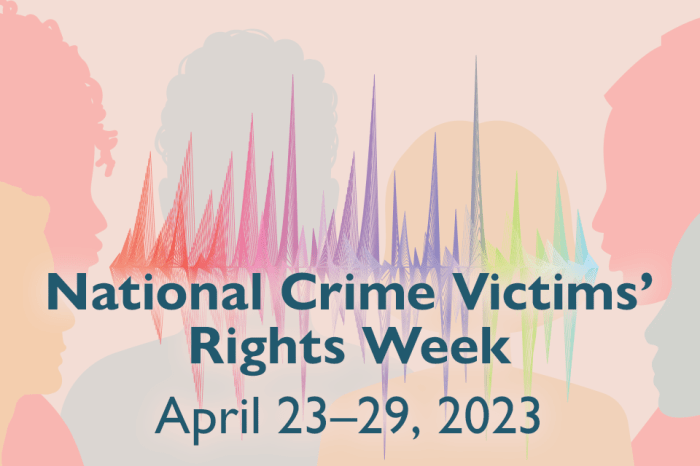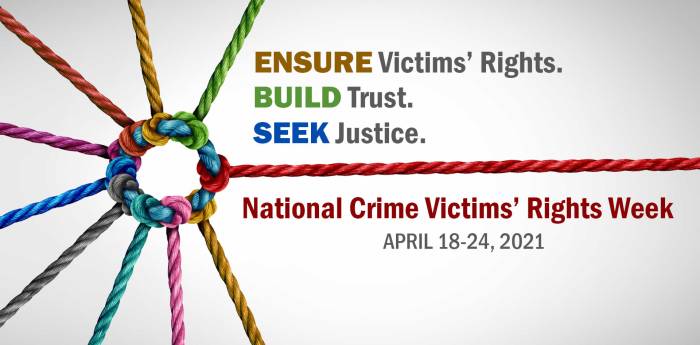The national center for victims of crime advises victims to – The National Center for Victims of Crime is a leading authority on providing support and resources to victims of crime. Their comprehensive advice empowers victims to navigate the legal system, access support services, and promote their recovery.
This guide explores the key recommendations from the National Center for Victims of Crime, offering practical strategies for victims to protect their rights, enhance their safety, and embark on the path to healing.
Victim Empowerment and Support
Victims of crime often experience a range of negative consequences, including physical, psychological, and financial harm. Empowering victims and enhancing their resilience is crucial for their recovery and well-being.
Strategies for Empowering Victims, The national center for victims of crime advises victims to
- Provide victims with information about their rights, resources, and support services.
- Encourage victims to participate in decision-making processes related to their case.
- Create opportunities for victims to connect with other victims and share their experiences.
- Provide training and support to victims to develop coping mechanisms and self-advocacy skills.
Importance of Victim-Centered Approaches
Victim-centered approaches focus on the needs and perspectives of victims. This approach recognizes the unique experiences and challenges faced by victims and aims to provide them with the support and resources they need to recover from the impact of crime.
Resources and Support Networks
- National Crime Victim Center: 1-800-394-2255
- National Sexual Assault Hotline: 1-800-656-HOPE
- National Domestic Violence Hotline: 1-800-799-SAFE
- Victim Services Directory: https://www.victimservicesdirectory.org
Reporting and Documentation

Reporting crimes and accurately documenting the details is essential for victims to seek justice and access support services.
Process of Reporting Crimes
- Contact law enforcement immediately after the crime occurs.
- Provide a clear and detailed account of the incident, including the time, location, and any witnesses.
- Obtain a copy of the police report for your records.
Significance of Accurate Documentation
Accurate documentation can help to support the victim’s case in court, provide evidence for insurance claims, and connect victims with appropriate resources.
Tips for Collecting and Preserving Evidence
- Take photographs of injuries, damage, or the crime scene.
- Collect any physical evidence, such as clothing, weapons, or DNA samples.
- Keep a record of all communication with law enforcement, witnesses, and other parties involved.
Safety Planning and Risk Assessment

Developing a safety plan and assessing risk factors can help victims of crime protect themselves from further harm.
| Safety Planning Measures |
|---|
| Develop a list of safe places to go in case of danger. |
| Identify people you can trust to contact in an emergency. |
| Create a code word or signal to alert others if you need help. |
| Carry a personal safety alarm or other self-defense device. |
| Consider changing your locks or installing a security system. |
Methods for Assessing and Managing Risk Factors
- Identify potential threats or danger signs.
- Develop strategies to avoid or minimize contact with the perpetrator.
- Seek professional help from a victim advocate or therapist to develop a comprehensive safety plan.
Legal Rights and Advocacy: The National Center For Victims Of Crime Advises Victims To

Victims of crime have certain legal rights and protections available to them.
Overview of Legal Rights
- Right to be informed of their rights and options.
- Right to protection from further harm or intimidation.
- Right to seek compensation for their injuries.
- Right to participate in the criminal justice process.
Role of Victim Advocates
Victim advocates provide support and assistance to victims of crime throughout the legal process.
- Explain victims’ rights and options.
- Accompany victims to court or other legal proceedings.
- Assist victims in obtaining compensation and other resources.
Strategies for Advocating for Victims’ Rights
- Educate victims about their rights and the legal process.
- Provide support and encouragement to victims throughout the legal process.
- Collaborate with law enforcement and other stakeholders to ensure victims’ rights are protected.
Trauma and Recovery

Victimization can have a significant impact on the psychological and emotional well-being of victims.
Common Psychological and Emotional Effects
- Anxiety
- Depression
- Post-traumatic stress disorder (PTSD)
- Guilt
- Shame
Resources and Strategies for Coping with Trauma
- Seek professional help from a therapist or counselor.
- Join a support group for victims of crime.
- Practice self-care activities, such as exercise, meditation, or spending time in nature.
- Connect with friends and family for support.
Guidance on Seeking Professional Help
If you are struggling to cope with the effects of victimization, it is important to seek professional help. A therapist or counselor can help you process your experiences, develop coping mechanisms, and improve your mental health.
Quick FAQs
What is the role of the National Center for Victims of Crime?
The National Center for Victims of Crime is a non-profit organization that provides support, resources, and advocacy for victims of crime.
What are the key recommendations from the National Center for Victims of Crime?
The National Center for Victims of Crime advises victims to report crimes, document evidence, create safety plans, understand their legal rights, and seek support for trauma recovery.
How can victims access support from the National Center for Victims of Crime?
Victims can access support from the National Center for Victims of Crime through their website, helpline, and local affiliates.